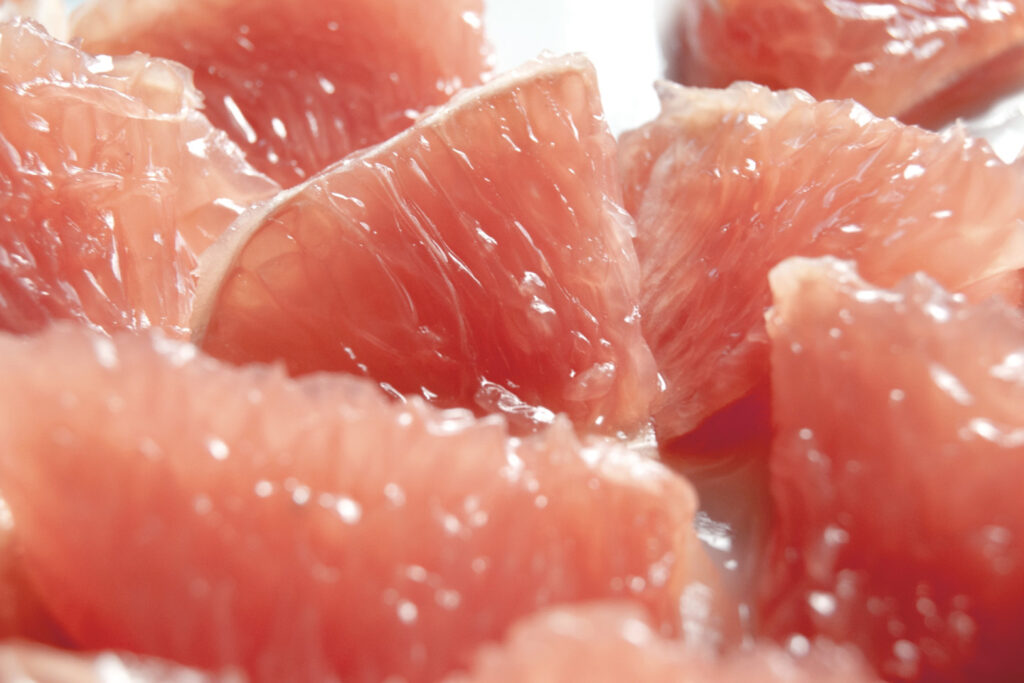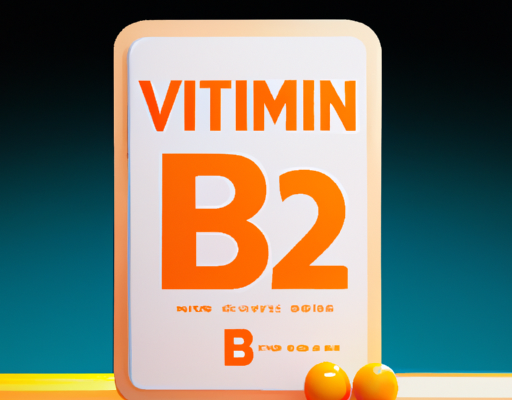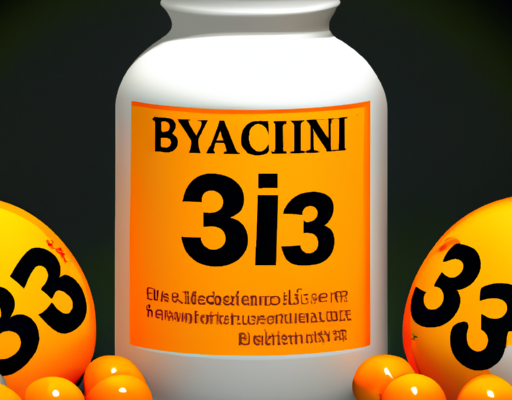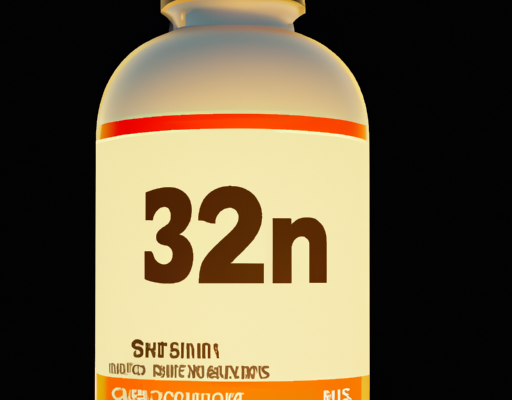Grapefruit is a product worth paying attention to as it is a source of Vitamin C, dietary fiber, minerals, and antioxidants. It is believed that grapefruit helps in weight normalization, improving skin and vessel health. It contains many important microelements for health. However, there are contraindications for grapefruit.
What is important to know about grapefruit

Grapefruit is the result of the crossbreeding of orange and pomelo. Depending on the variety, it can be of different sizes, and the pulp can differ in color from bright red to pale yellow. It got its name due to the fact that during ripening grapefruits look like clusters of grapes (from English grape).
The flesh of the fruit has a sweet and sour taste, and thanks to its piquancy, grapefruit is great for desserts, salads, and hot dishes. Its beneficial properties are used in cosmetology, and extract is made from the seeds, pulp, and white membranes. It can be found in food additives, household chemicals, perfumes, and aromatherapy.
Calorie content and nutritional value of grapefruit
According to the US Department of Agriculture, 100g of grapefruit contains:
- 42 calories;
- 0.8 g of proteins;
- 0.1 g of fat;
- 10.7 g of carbohydrates;
- 1.6 g of dietary fiber;
- 22 mg of calcium;
- 9 mg of magnesium;
- 18 mg of phosphorus;
- 0.1 mg of iron;
- 135 mg of potassium;
- 31.2 mg of Vitamin C;
- 1150 IU of Vitamin A.
Grapefruit contains a lot of vitamins A and C, dietary fiber, potassium, pectin.
The Benefits of Grapefruit

The nutrients contained in grapefruit can contribute to healthy skin, digestion, cardiovascular system and immune system.
1. Can help reduce the risk of type 2 diabetes
Consumption of grapefruit can help to control insulin levels and thus reduce the likelihood of insulin resistance and type 2 diabetes.
In one study, participants who ate half a fresh grapefruit before meals significantly reduced their insulin levels and resistance to it.
Grapefruit has a low glycemic index. This means that it provides the body with nutrients without having a negative effect on blood sugar levels.
The authors of one experiment note that grapefruit contains naringin. In properties, it is similar to the inhibitor that doctors use to improve glucose tolerance in people with type 2 diabetes.
2. Helps normalize weight
Grapefruit contains a lot of fiber that helps to regulate weight: it prolongs the feeling of satiety, and therefore fewer calories are consumed.
One study involving 91 people with obesity showed that those who ate half a fresh grapefruit before meals lost significantly more weight than those who did not. Participants in the group who ate fresh grapefruits lost an average of 1.6 kg in 12 weeks. Those who did not eat fruit lost about 0.3 kg.
Other experiments have also found similar weight loss effects. For example, participants reduced waist size when they ate grapefruit daily along with other products. This does not mean that the fruit itself will lead to weight loss, but it can contribute to the process if it is added to a balanced diet.
3. Reduces the risk of stroke
Flavonoids are plant compounds, natural dyes that are found in fruits, vegetables and berries. According to a study by the American Heart Association (AHA), consuming more flavonoids may reduce the risk of ischemic stroke among women. The risk of this disease was 19% lower among those whose diet had the highest amount of citrus.
4. Positively affects blood pressure and heart health

The combination of dietary fiber, potassium, lycopene, Vitamin C, and choline in grapefruit may contribute to heart health.
AHA recommends increasing potassium in the diet and reducing salt intake, which helps to normalize blood pressure. According to the US Department of Agriculture, one small grapefruit weighing about 200 grams contains 278 mg of potassium, which is about 6% of a person’s daily need for this mineral.
The DASH diet, developed by medical professionals to reduce blood pressure through dietary options, includes grapefruit as a recommended food.
5. Increases immunity

Grapefruit contains lots of Vitamin C. It has antioxidant properties: it protects cells from harmful bacteria and viruses. Several studies have shown that Vitamin C helps people recover from colds faster.
Other vitamins and minerals found in grapefruit also help to maintain immunity, including Vitamin A. It can reduce inflammation and the risk of infection.
Grapefruit also contains a small amount of B vitamins, zinc, copper and iron, which help the immune system work, maintain the integrity of the skin, which acts as a barrier to infection.
6. Contains lots of antioxidants
Antioxidants protect cells from damage caused by free radicals, which can trigger unwanted processes in the body.
Grapefruit contains Vitamin C, beta-carotene, lycopene, flavonoids. They also affect eye health, reduce cholesterol and pressure.
7. Can reduce the risk of kidney stone formation
The lemon acid contained in grapefruit can effectively prevent the formation of stones. It binds to calcium in the kidneys and excretes it from the body. It also has the ability to increase the volume and pH of urine, creating an environment less favorable for the formation of stones in the kidneys.
How to choose a grapefruit

Grapefruits are best bought in winter, as this is usually when they ripen and are sold fresh. Ripe fruits are heavier per weight, and they can also be slightly squeezed in the hand. Unlike other fruits, grapefruits do not ripen after harvesting, and it is best to store them in a dark place at room temperature.
Side effects
If a person is taking statins, some psychotropic drugs, calcium channel blockers, it is better for them to consult a doctor before eating grapefruit. This fruit has the property of binding enzymes, which can lead to the fact that medications will enter the bloodstream from the intestine faster than usual. The level of drugs in the blood will be higher than necessary, which can lead to dangerous consequences.
Since grapefruit contains a lot of potassium, people with kidney infection should eat it carefully. In this case, the excretion of excess of this element will be limited, and an overdose of potassium leads to health problems.
People with gastroesophageal reflux disease may experience an increase in heartburn and hiccups when consuming grapefruit, as it is very acidic.
Expert comment
Grapefruit is a good source of fiber. However, mechanical or thermal processing can increase the absorption rate of the fruit, thus there is a chance that the feeling of satiety after eating will be maintained less.
For weight normalization, only one strategy is effective – reducing the daily caloric content of the diet relative to energy expenditure. How exactly and with which products a person achieves this is not so important. But if you choose between natural sources of fiber and vitamins and biologically active supplements, then grapefruit wins.

There is no limit to the amount of grapefruit that is universal for all people. It is important to remember that when increasing the volume of citrus, one can encounter pseudoallergy – a feeling of itching, redness of the skin, arising from the consumption of a large amount of some product. Thus, for example, patients describe skin manifestations after the New Year’s mass eating of mandarins. This is not an allergic reaction of the first type in its classical manifestation, because in such a case rash and itching could already appear from touching the juice of the fruit when it is cleaned or when a small portion is consumed. With pseudoallergy, the manifestations are dose-dependent and do not launch an immune reaction.
For effective compliance with any nutrition recommendations, it is important that food be not only beneficial but also tasty. So it is hardly worth feeding yourself with peel and seeds, even if the amount of vitamins in them is maximum.
Patients with gastroenterological pathology can orient themselves on individual tolerance. For example, a person with GERD (gastroesophageal reflux disease) can eat grapefruits and other citrus fruits if they do not cause him heartburn, in the amount that does not provoke the development of unpleasant symptoms. If even a small portion of the fruit causes pain or heartburn, it is better to refrain from its use.

If a person has cardiovascular disease, it is important to discuss the possibility of consuming grapefruit with the treating doctor, as grapefruit juice can alter the metabolism of a large number of drugs, in particular statins (cholesterol-lowering drugs), amiodarone (an antiarrhythmic drug), anticoagulants warfarin, and many others. Patients undergoing psychotherapy and psychiatrists must also carefully study their interactions. Grapefruit juice reduces the effectiveness of some anti-allergy drugs, such as fexofenadine, which should be taken into account when treating, for example, chronic urticaria or acute allergic reactions.
In the case of an established allergic reaction, the allergen should be completely excluded, regardless of its source. It is also worth remembering that biologically active additives are at the top of the list of causes of toxic hepatitis in the world. Perhaps a more justified tactic will be to look for useful substances in other products, since there is nothing fundamentally irreplaceable and contained only in grapefruit.
Expert comment
Grapefruit is a relatively new type of citrus fruit, resulting from the cross-breeding of an orange and a pomelo. The fruit is rich in vitamins B, A, C, D, and PP. It also contains potassium, magnesium, calcium, and phosphorus. Grapefruit has antioxidant and protective properties. The amount of vitamin C in one fruit is enough to satisfy an adult’s daily needs. The vitamin C content will not only help protect against colds, but also improve skin color! A total of 20 varieties of grapefruit are known. Mainly-four.
- Red grapefruits are the sweetest, thanks to their higher fruit sugar content. The most well-known variety of red grapefruits is “Ruby”, fruits of this group contain more substances that reduce cholesterol than yellow varieties.
- Pink grapefruits are not as sweet as fruits with red flesh, they contain less sugar. A bright representative is the “Flame” variety.
- Yellow grapefruits have a sweet-sour taste with a pronounced tartness, which is beneficial to the elasticity of blood vessels and the work of the heart. The “Marsh” variety belongs to them.
- White grapefruits are not too sweet, they contain more tartness than other varieties, with a pronounced sourness. They are the ones used in the diet of a person wishing to lose weight, as they contain the least sugar. The representative of this group is “Duncan”.
Grapefruit, unlike the rest of the citrus family, is bitter due to the presence of narigin flavonoid. It improves the elasticity of vessels, as well as accelerates digestion and metabolism. The main difference between grapefruit and other citrus is the inositol substance, which prevents the accumulation of fat, as well as helps to remove toxins from the liver. It has less vitamin C than oranges, but due to its useful properties and pleasant taste, it has become popular all over the world.





No Comments